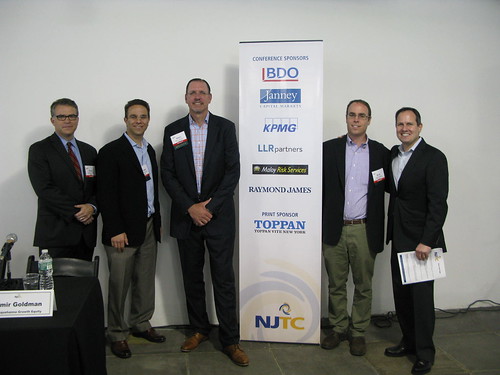By Eric Minnick, Edison Ventures Associate
Recent outsized exits in financial services technology, such as the Vantiv-Mercury Payment Systems deal, are serving as a catalyst for more entrepreneurs entering the space. This influx of talent and innovation makes it an exciting time to be investing in FinTech, but at the same time, raises the question, “Are we experiencing a FinTech bubble in today’s marketplace?”
Last week, the New Jersey Tech Council (NJTC) held its annual FinTech Conference, and there was a notable panel of an impressive cast of leading FinTech investors, moderated by Andy Gilbert, partner at DLA Piper:
Michael Kopelman, general partner, Edison Ventures
Mitchell Hollin, partner, LLR Partners
Amir Goldman, managing director, Susquehanna Growth Equity
Marc Lederman, co-founder and general partner, NewSpring Capital
This question of a FinTech bubble sparked great debate among the panel. The dynamics and perspectives at play can be summarized into four key points:
- Per Kopelman and Hollin, the market is cyclical, but certain sectors are demanding higher valuations than others, due in part to improved public market conditions. Public markets are used to value many FinTech deals and are driving value up.
- A “west coast mentality” seems to be creeping into east coast investing, meaning more money is chasing deals causing higher valuations.
- Regulations are making certain market segments more attractive right now for investors. Most specifically, compliance is a hot area to which companies are flocking.
- Goldman asserted that the big guys (namely Google, Apple and Amazon) are looking for mobile payments companies and their presence will drive high valuations for VCs in those markets, and represent the opportunity for an extremely out-sized return. Most of the panel pushed back on this assertion (“west coast mentality,” anyone?), as the reality is most of companies getting high valuations won’t be purchased by those big companies. The viewpoint expressed in opposition was one of more tempered expectations in that segment and hope for lower valuations and expectations.
While this panel has been investing far longer than I have, they shared perspectives and ideas consistent with what I’ve been hearing from entrepreneurs. FinTech CEOs have high expectations for their companies’ direction and their exit potential. The excitement is contagious, but makes it challenging to keep goals in perspective. As the panel noted, the influence of players, such as Google and Apple, with plenty of cash and the propensity to spend is having a major impact on certain segments. It will be fascinating to watch how their influence may impact future deals.
This FinTech bubble question is very relevant one with a couple of huge exits and outsized valuations. There are a number of different explanations for why that is the case, from the improvement in the public sector through different buyers changing the landscape. However, there is a lack of consensus as to whether this is a new status quo or just a market cycle.
Let me know what you think about the current trends in the FinTech market. Did the panel miss any key market dynamics?
